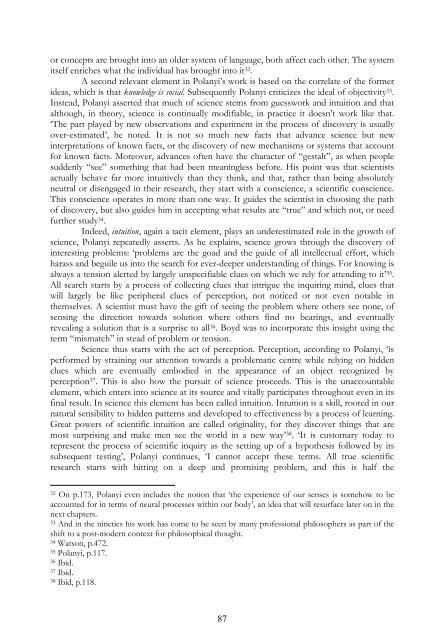Science, Strategy and War The Strategic Theory of ... - Boekje Pienter
Science, Strategy and War The Strategic Theory of ... - Boekje Pienter
Science, Strategy and War The Strategic Theory of ... - Boekje Pienter
You also want an ePaper? Increase the reach of your titles
YUMPU automatically turns print PDFs into web optimized ePapers that Google loves.
or concepts are brought into an older system <strong>of</strong> language, both affect each other. <strong>The</strong> systemitself enriches what the individual has brought into it 32 .A second relevant element in Polanyi’s work is based on the correlate <strong>of</strong> the formerideas, which is that knowledge is social. Subsequently Polanyi criticizes the ideal <strong>of</strong> objectivity 33 .Instead, Polanyi asserted that much <strong>of</strong> science stems from guesswork <strong>and</strong> intuition <strong>and</strong> thatalthough, in theory, science is continually modifiable, in practice it doesn’t work like that.‘<strong>The</strong> part played by new observations <strong>and</strong> experiment in the process <strong>of</strong> discovery is usuallyover-estimated’, he noted. It is not so much new facts that advance science but newinterpretations <strong>of</strong> known facts, or the discovery <strong>of</strong> new mechanisms or systems that accountfor known facts. Moreover, advances <strong>of</strong>ten have the character <strong>of</strong> “gestalt”, as when peoplesuddenly “see” something that had been meaningless before. His point was that scientistsactually behave far more intuitively than they think, <strong>and</strong> that, rather than being absolutelyneutral or disengaged in their research, they start with a conscience, a scientific conscience.This conscience operates in more than one way. It guides the scientist in choosing the path<strong>of</strong> discovery, but also guides him in accepting what results are “true” <strong>and</strong> which not, or needfurther study 34 .Indeed, intuition, again a tacit element, plays an underestimated role in the growth <strong>of</strong>science, Polanyi repeatedly asserts. As he explains, science grows through the discovery <strong>of</strong>interesting problems: ‘problems are the goad <strong>and</strong> the guide <strong>of</strong> all intellectual effort, whichharass <strong>and</strong> beguile us into the search for ever-deeper underst<strong>and</strong>ing <strong>of</strong> things. For knowing isalways a tension alerted by largely unspecifiable clues on which we rely for attending to it’ 35 .All search starts by a process <strong>of</strong> collecting clues that intrigue the inquiring mind, clues thatwill largely be like peripheral clues <strong>of</strong> perception, not noticed or not even notable inthemselves. A scientist must have the gift <strong>of</strong> seeing the problem where others see none, <strong>of</strong>sensing the direction towards solution where others find no bearings, <strong>and</strong> eventuallyrevealing a solution that is a surprise to all 36 . Boyd was to incorporate this insight using theterm “mismatch” in stead <strong>of</strong> problem or tension.<strong>Science</strong> thus starts with the act <strong>of</strong> perception. Perception, according to Polanyi, ‘isperformed by straining our attention towards a problematic centre while relying on hiddenclues which are eventually embodied in the appearance <strong>of</strong> an object recognized byperception 37 . This is also how the pursuit <strong>of</strong> science proceeds. This is the unaccountableelement, which enters into science at its source <strong>and</strong> vitally participates throughout even in itsfinal result. In science this element has been called intuition. Intuition is a skill, rooted in ournatural sensibility to hidden patterns <strong>and</strong> developed to effectiveness by a process <strong>of</strong> learning.Great powers <strong>of</strong> scientific intuition are called originality, for they discover things that aremost surprising <strong>and</strong> make men see the world in a new way’ 38 . ‘It is customary today torepresent the process <strong>of</strong> scientific inquiry as the setting up <strong>of</strong> a hypothesis followed by itssubsequent testing’, Polanyi continues, ‘I cannot accept these terms. All true scientificresearch starts with hitting on a deep <strong>and</strong> promising problem, <strong>and</strong> this is half the32 On p.173, Polanyi even includes the notion that ‘the experience <strong>of</strong> our senses is somehow to beaccounted for in terms <strong>of</strong> neural processes within our body’, an idea that will resurface later on in thenext chapters.33 And in the nineties his work has come to be seen by many pr<strong>of</strong>essional philosophers as part <strong>of</strong> theshift to a post-modern context for philosophical thought.34 Watson, p.472.35 Polanyi, p.117.36 Ibid.37 Ibid.38 Ibid, p.118.87
















